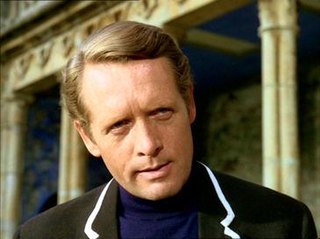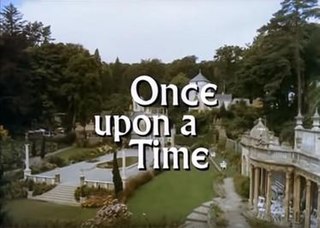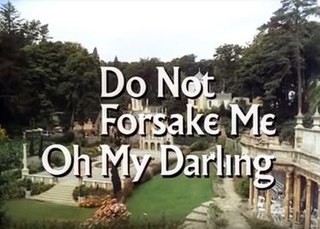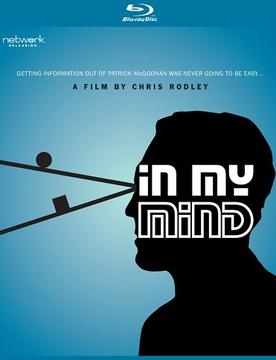
The Prisoner is a 1967 British television series created by and starring Patrick McGoohan, with possible contributions from George Markstein. McGoohan portrays Number Six, an unnamed British intelligence agent who is abducted and imprisoned in a mysterious coastal village after resigning from his position. The allegorical plotlines of the series contain elements of science fiction, psychological drama, and spy fiction. It was produced by Everyman Films for distribution by Lew Grade's ITC Entertainment.

Number Six is the central character in the 1967–1968 television series The Prisoner. The unnamed character in the original TV series was played by series co-creator Patrick McGoohan. For one episode, "Do Not Forsake Me Oh My Darling", Number Six was portrayed by Nigel Stock due to McGoohan being away filming the movie Ice Station Zebra.

Danger Man is a British television series that was broadcast between 1960 and 1962, and again between 1964 and 1968. The series featured Patrick McGoohan as secret agent John Drake. Ralph Smart created the programme and wrote many of the scripts. Danger Man was financed by Lew Grade's ITC Entertainment.

Strange Report is a British television crime drama series starring Anthony Quayle as Adam Strange. It was produced by ITC Entertainment and first broadcast in 1969 on ITV

"Arrival" is the first episode of the allegorical British science fiction TV series The Prisoner. It was written by George Markstein and David Tomblin, and directed by Don Chaffey. It was first broadcast in the UK on ITV on Friday 29 September 1967, and first aired in the United States on CBS on Saturday 1 June 1968.

"Fall Out" is the 17th and final episode of the allegorical British science fiction series The Prisoner. It was written and directed by Patrick McGoohan who also portrayed the incarcerated Number Six. The episode was first broadcast in the UK on ITV on Thursday 1 February 1968 and first aired in the United States on CBS on 21 September 1968.

Man in a Suitcase is a British television private eye thriller series produced by Lew Grade's ITC Entertainment. It originally aired in the United Kingdom on ITV from 27 September 1967 to 17 April 1968. ABC broadcast episodes of Man in a Suitcase in the United States from 3 May to 20 September 1968.

"Once Upon a Time" is the penultimate episode of the allegorical British science fiction TV series, The Prisoner. It was written and directed by Patrick McGoohan and sixth to be produced. It was first broadcast in the UK on ITV on Thursday 25 January 1968 and first aired in the United States on CBS on Saturday 14 September 1968.

Department S is a British spy-fi adventure series, produced by ITC Entertainment. It consists of 28 episodes which originally aired in 1969 and 1970. It stars Peter Wyngarde as author Jason King, Joel Fabiani as Stewart Sullivan, and Rosemary Nicols as computer expert Annabelle Hurst. These three are agents for a fictional special department of Interpol. The head of Department S is Sir Curtis Seretse.

"Living in Harmony" is an episode of the allegorical British science fiction TV series, The Prisoner. It was written by David Tomblin and Ian L. Rakoff and directed by Tomblin and was the fifteenth produced. It was broadcast in the UK on ITV on Friday 29 December 1967 and was not screened in the United States on CBS during the initial network run.

"Free for All" is an episode of the allegorical British science fiction TV series The Prisoner. It was written and directed by Patrick McGoohan and the second episode to be produced. It was the fourth episode to be broadcast in the UK on ITV on Friday 20 October 1967 and first aired in the United States on CBS on Saturday 29 June 1968.

Robotech is an American 85-episode adaptation of three unrelated Japanese anime television series made between 1982 and 1984 in Japan; the adaptation was aired in 1985. Within the combined and edited story, Robotechnology refers to the scientific advances discovered in an alien starship that crashed on a South Pacific island. With this technology, Earth developed giant robotic machines or mecha to fight three successive extraterrestrial invasions.

"It's Your Funeral" is an episode of the allegorical British science fiction TV series, The Prisoner. It was written by Michael Cramoy and directed by Robert Asher and eighth produced. It was the eleventh episode to be broadcast in the UK on ITV on Friday 8 December 1967 and first aired in the United States on CBS on Saturday 10 August 1968.

"Do Not Forsake Me Oh My Darling" is an episode of the allegorical British science fiction TV series, The Prisoner. It was written by Vincent Tilsley and directed by Pat Jackson and was the fourteenth produced. It was the thirteenth episode to be broadcast in the UK on ITV on Friday 22 December 1967 and first aired in the United States on CBS on Saturday 3 August 1968.

Eric Mival is a film editor, director, and music editor.

The Prisoner is a 2009 six-part television miniseries based on the 1960s TV series The Prisoner. The series concerned a man who awakens in a mysterious, picturesque, but escape-proof village, and stars Jim Caviezel, Sir Ian McKellen, Ruth Wilson, and Hayley Atwell. It was co-produced by American cable network AMC with British channel ITV, which now holds the rights to the original series. It received mixed reviews, with critics feeling that the remake was not as compelling as the original series.
The Prisoner, a British television series that originally ran from 1967 to 1968, has been represented in several other media.

The opening and closing sequences of the TV series The Prisoner are considered iconic. The music over the opening and closing credits, as broadcast, was composed by Ron Grainer, a composer whose other credits include the theme music for Doctor Who.

In My Mind is a 2017 British documentary film about Patrick McGoohan and the making of The Prisoner, the late 1960s allegorical science-fiction TV series. The documentary was created and narrated by Chris Rodley for the 50th anniversary of the original airing of the TV series in the UK. The film follows the events surrounding Rodley's visit to interview McGoohan in 1983 for a 1984 documentary about the making of the original series.



















